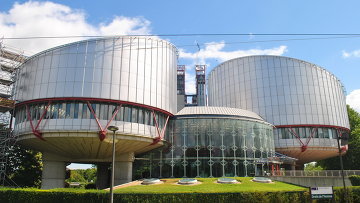STRASBOURG, December 3 (RAPSI, Alexander Karpov) - At the ongoing European Court of Human Rights (ECHR) hearing on the secret CIA run-prisons in Poland, the representatives of the Polish government called for more confidentiality of the proceedings, saying that the investigation was still in progress, RAPSI reports live from the courtroom.
Deputy Krakow Prosecutor of Appeal J. Sliwa told the court that the disclosure of classified materials required discretion, as the national proceedings need to be protected. This statement was met with lengthy rebuttals from the Zybaydah and Nashiri representatives, calling the investigation ineffective and saying that no significant developments were made in the last two years of the investigation.
Counsel for Abu Zubaydah B. Jankowski said that the purpose of the unexplained classifications of case materials was to withhold sensible information and avoid scrutiny by the Polish authorities.
After the sides presented their arguments, the judges went on to ask Poland’s representatives why the investigation was incepted only in 2008, two years after the high-value detainee (HVD) program was brought to light, and whether any significant progress or any new developments were made in the inquiries. Judge from Malta Vincent De Gaetano posed the question whether the procedural rules of ECHR should give way to the Polish local procedural rules, by which it was conducting its investigation.
The application was filed by two Guantanamo detainees Abd al Rahim al-Nashiri and Abu Zubaydah, and assert a series of violations of the European Charter of Human Rights (Charter) at the hands of Poland., which allegedly hosted an off the books facility for processing CIA-marked detainees.
The case presented reads that Poland took part in a special anti-terrorism effort led by the U.S., which involved subjecting prisoners to torture.
Application filed by Gitmo prisoner Abu Zubaydah says that the CIA was granted with more power after the 9/11 terror attacks. Zubaydah, reffered to as the “third most important man in Al-Quaeda hierarchy”, allegedly spent 9 months in Poland, where he was subjected to torture numerous times. Among other things, the “waterboarding” technique was used against him and he was placed in a box and exposed to extreme noise.
Later, Zubaydah was placed in GTMO’s maximum security block. He was not given the opportunity to meet with the lawyers representing him at the ECHR hearing, and was not formally charged during his incarceration.
The highly controversial anti-terrorist program was officially halted in 2006, but the materials and documents that can shed light on its nature remain classified to this day. Then-president George W. Bush admitted the same year that at least 14 key terrorist suspects have been processed at the CIA-run black site facilities, before being sent for Guantanamo Bay.
Bush called the prisons a “vital tool in the war on terror” and said that the intelligence gathered “helped to save lives”. He added that the detainees were treated humanely by the CIA, and that the suspects were not subjected to torture or any cruel treatment, and referred to the program’s nature as “an alternative set of procedures.”
The investigation launched by the Polish authorities into the accusations of torture and black ops detention facilities is set to expire in February 2014.



